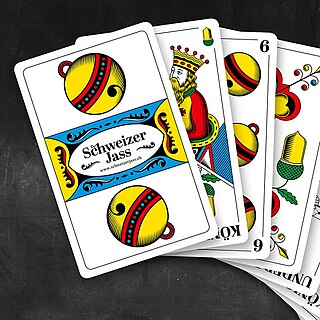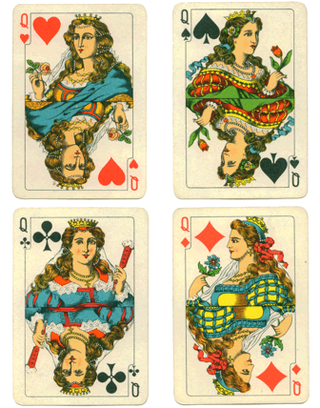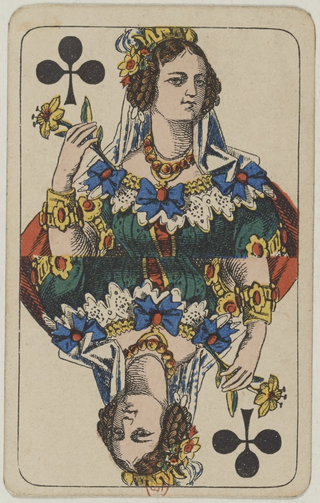
Pinochle, also called pinocle or penuchle, is a trick-taking ace–ten card game, typically for two to four players and played with a 48-card deck. It is derived from the card game bezique; players score points by trick-taking and also by forming combinations of characters into melds. It is thus considered part of a "trick-and-meld" category which also includes the game belote. Each hand is played in three phases: bidding, melds, and tricks. The standard game today is called "partnership auction pinochle".

A trick-taking game is a card or tile-based game in which play of a hand centers on a series of finite rounds or units of play, called tricks, which are each evaluated to determine a winner or taker of that trick. The object of such games then may be closely tied to the number of tricks taken, as in plain-trick games such as contract bridge, whist, and spades, or to the value of the cards contained in taken tricks, as in point-trick games such as pinochle, the tarot family, briscola, and most evasion games like hearts. Trick-and-draw games are trick-taking games in which the players can fill up their hands after each trick. In most variants, players are free to play any card into a trick in the first phase of the game, but must follow suit as soon as the stock is depleted. Trick-avoidance games like reversis or polignac are those in which the aim is to avoid taking some or all tricks.

Skat, historically Scat, is a three-player trick-taking card game of the ace–ten family, devised around 1810 in Altenburg in the Duchy of Saxe-Gotha-Altenburg. It is the national game of Germany and, along with Doppelkopf, it is the most popular card game in Germany and Silesia and one of the most popular in the rest of Poland. A variant of 19th-century Skat was once popular in the US. John McLeod considers it one of the best and most interesting card games for three players, and Kelbet described it as "the king of German card games." The German Skat Association assess that it is played by around 25 million Germans – more than play football.

Robbers' rummy is a card game for two or more players. It is a variant of German Rummy dating to the early 20th century. Being derived from normal rummy, it emphasises arrangement of cards based on card matching rules, while abandoning the notions of card discards and scoring entirely.

Jass is a family of trick taking, ace–ten card games and, in its key forms, a distinctive branch of the marriage family. It is popular in its native Switzerland as well as the rest of the Alemannic German-speaking area of Europe, Italian South Tyrol and in a few places in Wisconsin, Ohio, California, Oregon and Washington USA.

Doppelkopf, sometimes abbreviated to Doko, is a trick-taking card game for four players.

Klaberjass or Bela is a trick-taking ace–ten card game that is most popular in German communities. In its basic form it is a 9-card trick-and-draw game for two players using a 32-card piquet pack.

Jack–nine card games, also known as the Jass group from the German term for the jack, form a family of trick-taking games in which the jack and nine of the trump suit are the highest-ranking trumps, and the tens and aces of all suits are the next most valuable cards. Games in this family are typically played by 2 or 4 players with 32 French-suited cards.

The following is a glossary of terms used in card games. Besides the terms listed here, there are thousands of common and uncommon slang terms. Terms in this glossary should not be game-specific, but apply to a wide range of card games played with non-proprietary packs. It should not include terms solely related to casino or banking games. For glossaries that relate primarily to one game or family of similar games, see Game-specific glossaries.
Ramsch, formerly also called Mike in East Germany, is a card game based on the contract of the same name in the popular German card games, Skat and Schafkopf. However, thanks to its interesting mode of play it has since developed into an independent game in its own right which is only loosely based on Skat or Schafkopf. It should not be confused with the games of the Rams family – Ramsen and Ramscheln – that also go by the name Ramsch.
Schneider is a term used in many card games for a low card point score that results in boosting an opponent's game score. The threshold is usually half the total points needed for a win; below the threshold, the player or team is Schneider; above it they are 'out of Schneider'. Its natural extension is Schwarz, said of a player or team who loses the game without taking a single trick.

German Rummy or Rommé is the most popular form of the worldwide game, Rummy, played in Austria and Germany. It is a game for 2 to 6 players and is played with two packs of French playing cards, each comprising 52 cards and 3 jokers. There are no partnerships. In Germany, the Germany Rummy Association is the umbrella organisation for local rummy clubs and organises national competitions. The game is often just known as Rommé in Germany and Rummy in Austria.

1000 is an easy-to-learn card game for two or three players. Its simple rules make it suitable for players to quickly become familiar with the basic concepts of trick-taking and trump-based card games. The name is taken from the score at the end of the game.

Viennese Rummy is a matching card game of the Rummy family for 2-6 people played in continental Europe.

Binokel is a card game for two to eight players that originated in Switzerland as Binocle, but spread to the German state of Württemberg, where it is typically played with a Württemberg pattern pack. It is still popular in Württemberg, where it is usually played in groups of three or four as a family game rather than in the pubs. In three-hand games, each player competes for himself, while in four-hand games, known as Cross Binokel (Kreuzbinokel), two teams are formed with partners sitting opposite one another. The game was introduced to America by German immigrants in the first half of the 20th century, where it developed into the similar game of pinochle. Binocle was still played in Switzerland in 1994. In south Germany, the game is sometimes called by its Swabian name, Benoggl.

Solo 66 is a trick-taking ace–ten card game for five players, in which a soloist always plays against the other four. It is based on the rules of Germany's national game, Skat, and is played with a French-suited Skat pack of 32 cards. Bidding is for the trump suit. Jacks are ranked within their respective suits and do not form additional trumps over and above the cards of the trump suit. Grupp describes it as "an entertaining game for a larger group."

Bauerchen, also Bauerchens, Bauerspiel, Bauersche or Bauersches, is a trick-taking card game of the ace–ten family for four players that is played in the Palatinate region of Germany, especially around the city of Kaiserslautern, as well as in south Hesse. It is often played during leisure times as an alternative to well known games such as Schafkopf or Skat. Regular Bauerchen tournaments also take place. The game is named after its four permanent trumps or "Bowers".

The following is a glossary of Skat terms used in playing the card game of Skat. Although Skat has German origins, it has now become an international game, often played to official rules. This glossary includes terms which are common or regional, official or unofficial, as well as those used for special situations, starting hands, card combinations and terms relating to players. Many of the terms are also used in other trick-taking or ace–ten games or even in card games in general.

Baśka is a fast-moving, Polish card game for four players played using traditional French-suited playing cards. It uses a shortened pack of just 16 cards and is similar to kop which is also played in Poland. Both are derived from German Schafkopf.

Sjavs is a Danish card game of the Schafkopf family that is played in two main variants. In Denmark, it is a 3-player game, played with a shortened pack of 20 cards; in the Faroe Islands, where it is very popular, it is a four-hand, partnership game using a standard piquet pack of 32 cards.
















